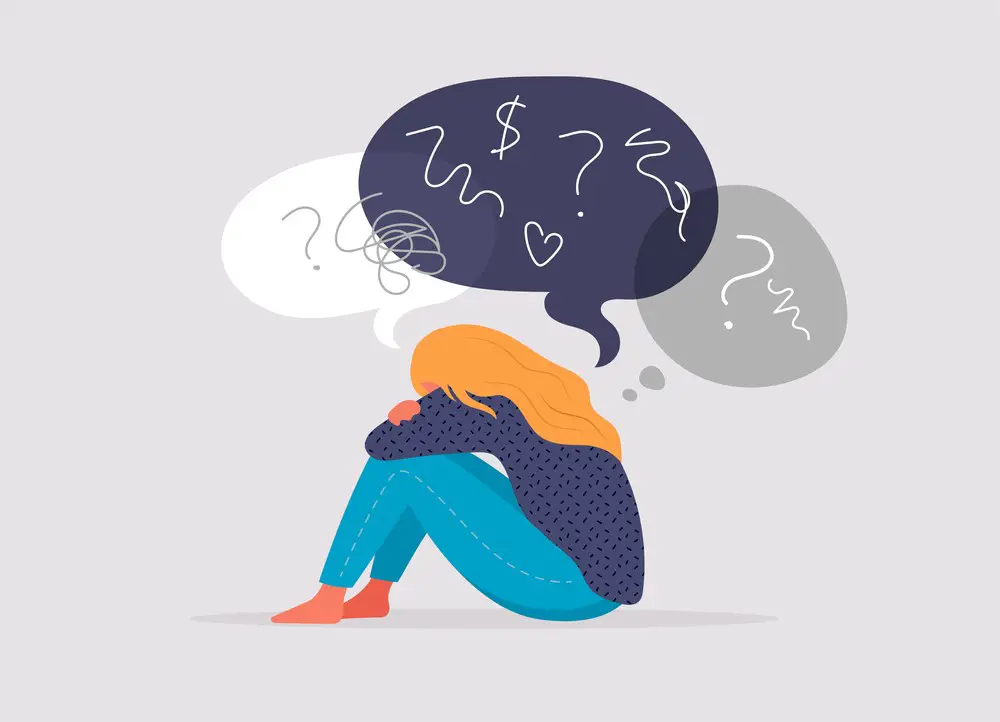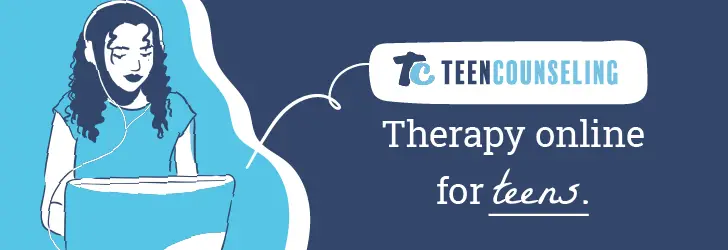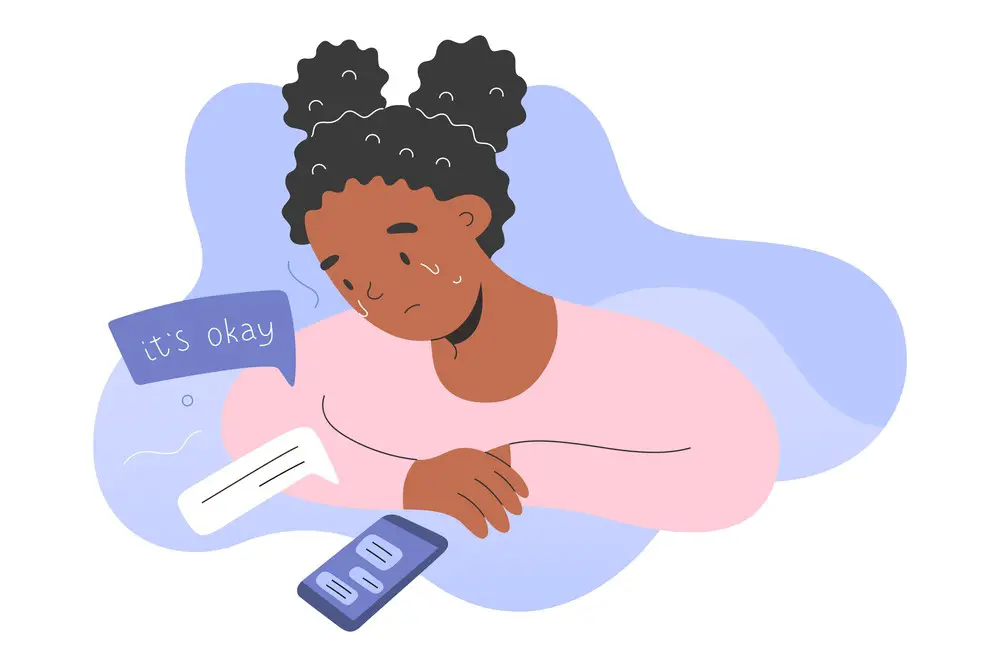As a BetterHelp affiliate, we receive compensation from BetterHelp if you purchase products or services through the links provided
Recognizing when your teenager needs professional assistance to manage their mental health can be daunting for parents or guardians. This blog post will examine the indicators suggesting therapy is necessary for teenagers, highlight the benefits of therapy, and offer guidance on finding a therapist specializing in adolescent mental health. It’s crucial to take action for your teenager’s well-being and seek professional help when needed.
Signs that a teenager may need therapy
Changes in behavior or personality, difficulty coping with stress or emotions, and struggles with relationships or social interactions are all signs that a teen may need counseling to address their mental health. Teens who experience academic decline or disinterest may also benefit from therapy as it can help them manage the underlying emotional issues impacting their motivation and focus. Additionally, a trained mental health professional should assess teens who engage in substance use or self-harm behaviors for potential treatment options through counseling. Addressing these challenges early on can help teens develop healthy coping mechanisms and improve their overall well-being.
Changes in behavior or personality
Persistent sadness or irritability, withdrawal from family and friends, and sudden changes in eating or sleeping habits are all signs of potential mental health concerns for teenagers. These behaviors can become more severe if left unaddressed, impacting their overall well-being. Seeking counseling early on can help identify underlying issues and provide tools to manage stressors.
Parents need to communicate with their teens about any concerning changes in behavior or personality. Mental health should be a priority, just like physical health. Encouraging open communication and seeking professional help when necessary can make a significant difference in the long-term mental wellness of your teenager.
Difficulty coping with stress or emotions
Frequent panic attacks or anxiety, feelings of hopelessness and helplessness, and an inability to control anger can be challenging for anyone to handle. However, these emotions can feel insurmountable for teens still developing coping mechanisms. If your teen is experiencing any of these symptoms regularly and they interfere with their daily life or ability to enjoy activities they once enjoyed, seeking counseling may be beneficial. A therapist trained in mental health can help them develop healthy coping mechanisms that will allow them to manage stressors more effectively.
A mental health professional can also support your teenager through underlying issues that may contribute to developing negative emotional states. Counseling services offer a safe space where individuals can express themselves freely without fear of judgment or retribution while learning skills that improve their overall quality of life.

Struggles with relationships or social interactions
Teens who struggle with relationships or social interactions often experience isolation from peers and difficulty making new friends. Bullying, cyberbullying, harassment, and other forms of mistreatment can further exacerbate this issue. These experiences can lead to anxiety, depression, and other mental health problems requiring counseling or therapy.
Additionally, some teens may face challenges interacting with authority figures such as teachers or parents. This might manifest in defiance or withdrawal behavior, indicating underlying emotional distress. In these cases, it is also important to consider seeking the help of a mental health professional with experience working with teens.
Academic decline or disinterest
Poor grades despite the effort put forth, a ‘giving up’ mentality towards schoolwork/homework/projects/etc., and disruptive behavior in class are all signs of academic decline or disinterest. These behaviors can indicate underlying mental health issues requiring counseling or therapy. Parents and educators must recognize these warning signs early and seek appropriate help.
If your teen is showing any of the following behaviors, it may be time to consider seeking counseling or therapy:
- Consistent poor grades despite putting in the effort
- Giving up easily on schoolwork/homework/projects/etc.
- Acting out during class with disruptive behavior
It’s crucial to prioritize your teen’s mental health alongside their academic success. Seeking professional support from therapists or counselors can help address any underlying issues causing the decline/disinterest in academics and work towards improving overall well-being.
Substance use or self-harm
Experimentation with drugs, alcohol, or tobacco products at a young age can lead to potentially harmful consequences later in life. Teens may be more likely to engage in these behaviors to cope with stress, emotions, or peer pressure. Signs of self-injury, such as cutting, burning, or other forms of physical harm, could also indicate underlying mental health issues that require counseling.
Parents and caregivers need to pay attention to any ‘hiding’ behaviors that could indicate substance abuse/self-harm, including secretive behavior or sudden changes in routine. Seeking the help of a therapist who specializes in teen mental health can provide support and guidance through difficult times. Early intervention and addressing these issues head-on can make all the difference in improving overall mental health outcomes for teens.
Benefits of therapy for teenagers
Therapy for teenagers can bring several benefits, including improved emotional well-being and enhanced coping skills. Through therapy, teenagers learn to process and manage their emotions healthily, making them feel more at peace with themselves. Additionally, therapy helps teenagers develop better communication skills that can improve relationships with family members and peers. Ultimately, investing in therapy early on can lead to increased self-esteem and confidence in young people as they navigate the challenges of adolescence.
Improved emotional well-being
Identifying and managing negative emotions is crucial for improved emotional well-being. When left unchecked, these emotions can lead to symptoms of anxiety and depression. Developing positive coping mechanisms can help alleviate stress and improve overall mental health.
Reducing symptoms of anxiety and depression
- Cognitive-behavioral therapy
- Mindfulness techniques
- Medication
Developing positive coping mechanisms
- Regular exercise
- Practicing self-care
- Engaging in hobbies/activities that bring joy
- Seeking support from friends or a therapist
Enhanced coping skills
Effective problem-solving strategies can be learned through therapy sessions, which can enhance your coping skills. By identifying the root cause of your stressors and working with a therapist, you can develop effective ways to approach problems that arise in daily life. This skill is essential for reducing stress levels and improving emotional resilience.
Therapy also helps build resilience to stressors by providing individuals with tools to manage their emotions better. Learning techniques such as mindfulness or cognitive-behavioral therapy (CBT) help people recognize negative thought patterns and reframe them positively, increasing overall mental health wellness. Additionally, managing conflict in relationships – another topic often covered in therapy – further strengthens one’s ability to cope with stressful situations and improves communication skills within personal relationships.

Better communication and relationships
Improving family dynamics through better communication is crucial for a healthy and happy household. Here are some tips to enhance communication within your family:
- Set aside regular time for family meetings
- Practice active listening
- Use “I” statements instead of blaming or accusing language
- Encourage open dialogue without judgment
Expressing needs and boundaries in friendships/romantic relationships is also essential for healthy relationships. Consider these strategies:
- Identify your boundaries before entering into new relationships
- Communicate your needs and expectations clearly
- Respectfully listen to the needs of others
- Work together with compromise and understanding
Developing social skills can help teens navigate peer pressure, build strong interpersonal connections and foster self-confidence.
Some ways to strengthen social skills include:
- Practicing assertiveness by saying no when necessary
- Engaging in activities that interest you outside of school
- Joining clubs or groups with similar interests
- Attending counseling or therapy sessions when needed
Increased self-esteem and confidence
Exploring your values, strengths, and goals is a powerful way to boost self-esteem. You can gain a renewed sense of purpose and direction by understanding what drives you and your unique qualities. Challenging negative self-talk patterns with CBT techniques can also help build confidence by replacing harmful thoughts with positive affirmations.
Building a positive body image through mindfulness practices is another effective way to improve self-esteem. Mindfulness encourages individuals to tune in to their physical sensations without judgment or criticism, leading to greater acceptance of one’s body. Combined with other strategies such as exercise and healthy eating habits, practicing mindfulness can help teens develop a more positive relationship with their bodies and ultimately feel more confident.
Reduced risk of mental health disorders or suicide
Early intervention is crucial for potential mental health concerns such as mood or eating disorders. By identifying early warning signs, teens can receive the support and treatment they need before the situation worsens. In addition, screening for suicidal ideation or self-harm behaviors can provide further insights into a teen’s mental health state and allow appropriate measures to be taken. Education on warning signs of mental health crises can also equip teenagers with the tools to recognize symptoms in themselves and their peers, enabling them to intervene when necessary. These steps contribute towards reducing the risk of developing more severe mental health issues or experiencing suicide ideation within this age group.
When to seek professional help
If symptoms of depression, anxiety, or any other mental health issue persist or worsen despite trying self-help methods, it may be time to seek professional help. A licensed therapist can provide the necessary tools and support to manage these issues effectively. Additionally, therapy is strongly recommended if a teenager’s symptoms begin impacting their daily functioning and relationships with others.
When symptoms persist or worsen
If your teenager’s mental health symptoms persist or worsen over time, it may be time to consider seeing a therapist. Some signs that may indicate the need for therapy include changes in sleeping patterns, decreased interest in social activities, and difficulty concentrating.
Here are some specific red flags to look out for:
- Sleeping too much or too little
- Avoiding friends and family
- Trouble completing school work or getting good grades
- Using drugs or alcohol to cope with emotions
- Talking about self-harm or suicide
While these symptoms can be concerning, they are treatable with the help of a licensed professional. Don’t hesitate to seek guidance from a therapist if you notice any warning signs in your teenager’s mental health.
When symptoms interfere with daily life
A decline in academic performance, inability to complete usual tasks, and thoughts of self-harm or suicide are all signs that symptoms may interfere with daily life. When these symptoms persist for an extended period, it’s important to consider seeking the help of a therapist who can provide support and guidance through difficult times. A licensed therapist can work with teenagers to develop effective coping strategies and address underlying mental health concerns before they become more severe.
When a teenager expresses interest in therapy
When a teenager expresses interest in therapy, listening and supporting them is important. Common reasons for seeking therapy include feeling overwhelmed and needing help, not knowing how to handle emotions, or wanting someone to talk to about problems. Encourage them to share their thoughts and feelings with a therapist who can provide tools and strategies for coping with stressors.
Therapy can also promote self-awareness and develop positive behaviors that lead to better mental health outcomes. The decision of when a teenager should see a therapist ultimately depends on the severity of symptoms and the level of impairment they experience in daily life. Parents/guardians must remain open-minded about therapy as an effective tool for promoting overall well-being in teenagers.
When a parent or caregiver is concerned about the teenager’s mental health
If you are concerned about your teenager’s mental health, seeking help as soon as possible is important. If your child seems anxious all the time or has frequent mood swings, these may be signs of an underlying mental health condition that requires professional attention. Additionally, if you have noticed that your child is losing weight rapidly, this could also indicate a need for intervention.
It can be difficult to discern whether your teenager needs therapy or not. However, if any of these symptoms persist or worsen over time and impact their daily life at school or home, it may be time to consider seeking therapy. Remember that early intervention can lead to better outcomes and improved long-term mental health for your teen.
How to find a therapist for a teenager
Finding a therapist for a teenager can be challenging, but it’s important to seek help when needed. One way to start is by requesting referrals from trusted sources such as doctors, school counselors, or mental health professionals. These individuals may recommend someone specializing in adolescent therapy and understanding teenagers’ unique challenges.
Another option is searching online for licensed therapists or counseling services that specialize in working with teenagers. Look for reviews and testimonials from previous clients to understand their effectiveness and approach. It’s also wise to check with insurance providers for covered options so you can find a therapist that fits your budget.
Once you’ve narrowed down potential therapists, schedule an initial consultation with them before committing long-term. This will allow you and your teenager to evaluate fit and comfort before making a final decision on moving together toward improved mental wellness.

Ask for referrals from a doctor, school counselor, or mental health professional
Your pediatrician or family doctor can be a useful resource to determine whether your teenager may benefit from therapy. Don’t hesitate to speak with them about your concerns and ask for referrals to mental health professionals in the community. You can also contact the school guidance counselor for recommendations, as they often have experience working with students who face similar issues.
Additionally, contacting a mental health professional directly in your community can provide valuable advice on where to start. They may even offer consultation services or free resources to help you navigate potential stress management options for your teenager. Remember that seeking help is not a sign of weakness but an important step towards promoting overall well-being and growth.
Search online for licensed therapists or counseling services
You can easily find licensed therapists or counseling services online by using search engines like Google to locate local options. Websites such as Psychology Today offer databases of professionals categorized by location and specialty, making it easy to narrow down your choices. Reviewing reviews and ratings on therapist directory sites like Yelp can help you make informed decisions when selecting a therapist that best suits your needs. By utilizing these resources, you’ll be able to identify potential candidates for your mental health care team quickly.
Check with insurance providers for covered options
Call your insurance company and ask about their coverage policies for therapy sessions. Verify which therapists in your area accept the insurance plan you have to avoid paying out of pocket. In-network providers are often more affordable than out-of-network ones, so checking with your insurance provider before scheduling appointments is important.
Here are some things to keep in mind when checking with your insurance provider:
- Does my plan cover mental health services?
- How many therapy sessions does my plan cover per year?
- Is pre-authorization required before starting therapy?
- What is the co-pay or deductible for mental health services?
Schedule an initial consultation to evaluate fit and comfort
When seeking a therapist for your teenager, finding someone who feels like the right fit is essential. Take the time to ‘shop around’ until you find a therapist your teen feels comfortable sharing with. A successful therapy journey relies on trust and rapport between the teen and their therapist.
One way to determine if there is chemistry between your teen and their potential therapist is through ‘meet-and-greet’ consultations. These sessions help both parties evaluate whether they are suited to each other’s needs. Additionally, some therapists may offer lower-cost trial sessions to minimize risk, allowing you to try before you buy into long-term treatment plans.
Conclusion
In conclusion, seeking therapy for teenagers can be a beneficial step toward managing mental health. It’s important to recognize the signs that indicate a need for professional help, such as changes in behavior or mood. Additionally, parents should prioritize open communication and creating a supportive environment for their children to feel safe discussing their emotions.
Overall, it’s crucial to remember that there is no shame in seeking help and prioritizing one’s mental health. By addressing any concerns early on and taking proactive steps towards self-care, teenagers can develop healthy coping mechanisms and lead fulfilling lives.

FAQ
- Stress Management: What is the Relationship Between Stress and Addiction? - June 28, 2024
- Exploring Techniques to Maintain a Healthy Lifestyle without Drugs - May 28, 2024
- How Acupuncture Helps Treat Chronic Fatigue Syndrome - May 28, 2024
This site contains affiliate links to products. We will receive a commission for purchases made through these links.




